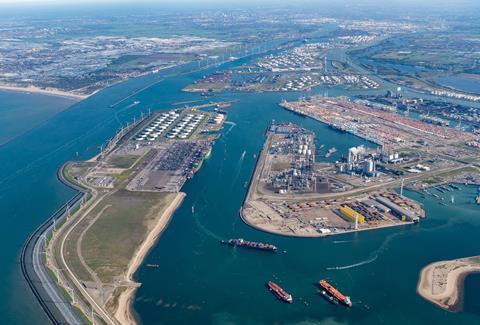Breakbulk volumes at the port of Rotterdam declined in 2024, dragged down by weaker demand for steel and non-ferrous metals. However, energy transition projects are pressing ahead, with major CO2 and hydrogen infrastructure developments shaping the port’s future.

Total throughput at the Port of Rotterdam amounted to 435.8 million tonnes in 2024, down 0.7 percent over 2023 (438.8 million tonnes). The decline in throughput was attributed to lower coal and crude oil throughput.
The breakbulk segment saw a decline of 3.7 percent year on year. Ro-ro traffic remained stable due to a strong fourth quarter, driven by the introduction of new services and larger vessels. Other breakbulk decreased by 10 percent due to lower throughput of steel and non-ferrous products, caused by reduced demand from European industry and sanctions on Russian aluminium.
Growth was recorded in the container segment, which was up 2.8 percent to 13.8 million teu driven by increased consumer spending.
Over the past year, the port authority highlighted several projects that have been launched that contribute to the energy transition. The construction of the CO2 transport and storage project Porthos has started. In the second half of the year, the construction of the compressor station, a key component of this project, got under way. As of 2026 the captured CO2 will be pressurised at the compressor station, before being transported via an offshore pipeline to a depleted gas field beneath the North Sea.
Construction of the hydrogen pipeline through the port and Shell’s hydrogen plant is also in full swing. Additionally, new agreements for the use of shore power have been signed with container terminals on the Maasvlakte. The shore power installation for Cruise Terminal Rotterdam is now complete and will be commissioned after a testing phase in the spring 2025.
Clarity has also been provided on the development of the Delta Rhine Corridor (DRC). While a four-year delay was announced earlier last year for the development of hydrogen and CO2 pipelines, a decision was made at the end of 2024 to prioritise these infrastructures. The hydrogen pipeline is now scheduled for completion in 2031/2032, and the CO2 pipeline in 2032/2033
More infrastructure and new solutions to relieve the electricity grid are needed to support the sustainability transition of Rotterdam’s industry, the port authority pointed out. Companies in the port complex that aim to become more sustainable face challenges related to permits, nitrogen regulations, high electricity tariffs, high energy prices, slow market development and increasing pressure on available space. The Port of Rotterdam Authority called for a clear and consistent industrial policy and reduced regulatory pressure from the Dutch government and the EU to facilitate the energy and raw materials transition.















